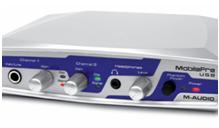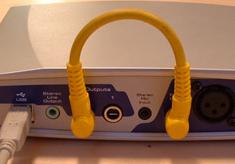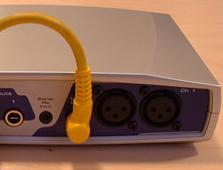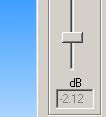Sound Cards – M-audio – Mobilepre USB
Step 1 – M-audio Mobilepre USB
 This sound card allows the user to control most settings from WinMLS.
This sound card allows the user to control most settings from WinMLS.
Click help for instructions on how to use this sound card.
Drivers must be installed, they can be downloaded from www.m-audio.com.
Step 2 – Cable for Delay Measurement
 This setup is set to line input (not microphone).
This setup is set to line input (not microphone).
For it to work with frequency/impulse response measurements where you want to measure the delay time, there must be a physical connection between input and output of channel 2.
If this is not connected as shown in the picture, you will get an error message when starting a measurement. You can change this from Measurement→System Delay.
The measurement system is corrected for as default. This can be turned off from Measurement→Settings.
Step 3 – Mic. Input and Output
 Connect the microphone to input Ch. 1, that is the rightmost input (XLR) shown in the wizard picture.
Connect the microphone to input Ch. 1, that is the rightmost input (XLR) shown in the wizard picture.
Connect the output to Output 1 shown to the left in the wizard picture (jack). This has to be a jack connector and it is mono.
Step 4 – Phantom Power
 If you connect a phantom-powered microphone directly to the sound card, you must make sure the button shown in the wizard picture is pushed and that the red light besides it is turned on.
If you connect a phantom-powered microphone directly to the sound card, you must make sure the button shown in the wizard picture is pushed and that the red light besides it is turned on.
In the wizard picture it is turned off, and this is a typical mistake that one forgets to turn on the phantom power.
Step 5 – Mixer
 The mixer input and output has been calibrated. This means that you can change the input and output volume in WinMLS and still maintain the same result. To open the mixer, go to Toolbars→Levels (and Mixer).
The mixer input and output has been calibrated. This means that you can change the input and output volume in WinMLS and still maintain the same result. To open the mixer, go to Toolbars→Levels (and Mixer).
We found that the output max levels gave a different frequency response, therefore it is taken out as an option. Therefore, the highest output gain is -2.12 dB as shown in the wizard picture
This means that only the lower part can be used to set the output level, use the arrow key to move in small steps.
Step 6 – Other Issues
 All low-cost sound cards have issues.
All low-cost sound cards have issues.
This setup is set with sampling frequency of 44100 Hz. Do use this and do not use 48000 Hz. This is set from Measurement→Settings….
Note: If using this sound card phantom power, the frequency response will drop with a few dB for higher frequencies.
You may correct for this and/or the response of your microphone using the microphone compensation feature. Click help for more information.